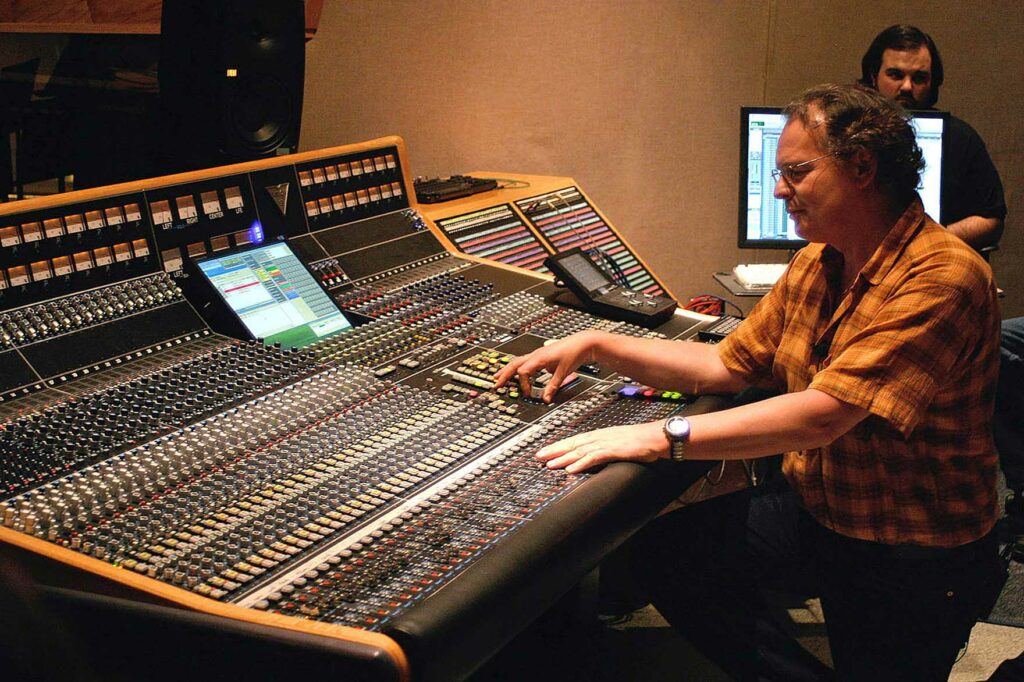Murfreesboro, TN – Jan. 2010:
In addition to the distinction of a degree from one of the pro audio industry's most highly-regarded educational programs, the future graduates of Middle Tennessee State University's Department of Recording Industry now benefit from the school's 2009 installation of an analog, 48-channel API Vision surround sound console. Aligned with the School of Mass Communication, the Department of Recording Industry is home to some 1,500 students seeking both Bachelors and Masters Degrees with sequences in Music Business, Production & Technology, and Commercial Songwriting. Many of the industry's leading figures stepped confidently into their first jobs clutching diplomas from MTSU, and the program's continued commitment to relevance and effective teaching maintains its top-tier status.
MTSU acquired the API Vision to exemplify high-quality analog fidelity, coupled with cutting edge surround sound technology. The Vision features 24 main buses, three stereo mix buses, a dedicated five-channel surround mix bus, and ten auxiliary send buses. Each channel features two full throw motorized faders. Panning is achieved with three pots adjacent to each fader: a mode-switchable LR/LCR pan, a front-rear fader pan, and a rear channel pan. Since all the busses are active, students can simultaneously mix in stereo and surround, and an intuitively-designed monitoring section allows for easy A/B-ing of the two formats. API's Instant Reset Switch System preserves mixes and makes it easy to pick up a mix where it was left off.
Graduate student Tim Hall is charged with the task of instructing freshmen in the delicate science of signal flow. "It's critical to have a traditional in-line analog console to do demonstrations with," said Hall. "Students today come to us with a confused view of gain structure from years of untutored fumbling with virtual mixers inside their computers. The physical reality of the API Vision makes the concept of signal flow concrete. The students finally get it."
Senior Chris Payne noted that the API Vision's analog pedigree has been an important part of his education at MTSU. "Although the digital workflow has made making great sounding music cheaper and easier," said Payne, "nothing that has been invented over time has made an improvement in sound quality over the analog technology companies like API came up with in the 60s." Senior Patrick McKinney added, "I've done most of my work on digital boards, and that edgy sound that I'm always fighting is never even an issue on the Vision. The analog sound that everybody talks about is real, and it makes a big difference!"
The students use the board for a vivid realization of the similarities and differences of mixing for the two formats. "I just finished a semester in that room, and we recorded a full band and mixed the recording down to stereo and 5.1," said senior Ryan Prewett. "It was easy to get a mix that sounded good, and then we focused on imaging within the stereo or surround field."
Apart from its analog bloodline, the API Vision is celebrated for its ability to provide simultaneous stereo and 5.1 mixes. Surround-sound guru Ronald Prent, chief engineer at Belgium's Galaxy Studios ( www.galaxystudios.com ), who for the last ten years has been researching and developing the best surround recording and mixing techniques under the auspices of Philips and Sony, went to MTSU this summer to conduct a seminar on the API Vision console. "I have to say that the Vision is the best analog console I have ever worked on during my thirty years in the audio industry," enthused Prent. "It hits all the right buttons: embodies great dynamics for any musical genre and has genuinely innovative functionality for modern multichannel recording techniques and it looks fantastic. Of course, it goes without saying that it sounds great." And Prent should know, as he was the first client to purchase the Vision console for Galaxy Studios and one of the key contributors to the design of the Vision's innovative panning, monitoring and channel design.
Concluded Daniel Pfeifer, professor and audio internship coordinator for the department of recording industry at MTSU, "The API has been a wonderful addition to our studios and has enabled our students to achieve some amazing results. It has made a huge difference for all of us!"
